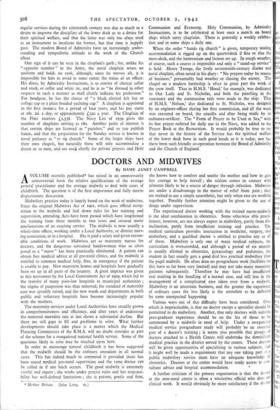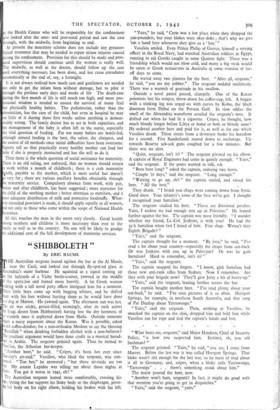DOCTORS AND MIDWIVES
By DAME JANET CAMPBELL AVOLUME recently published* has raised in an unnecessarily controversial form the relative qualifications of the average general practitioner and the average midwife to deal with cases of childbirth. The question is of the first importance and fully merits dispassionate discussion.
Midwifery practice today is largely based on the work of midwives. Since the original Midwives Act of 1901, which gave official recog- nition to the midwife and laid down rules for her training and supervision, amending Acts have been passed which have lengthened the training from three months to two years and secured many ameliorations of an exacting service. The midwife is now usually a whole-time officer, working under a Local Authority, or district nurs- ing association, or in a hospital. She is paid a salary and given reason- able conditions of work. Midwives act as. maternity nurses for doctors, and the dangerous untrained handywoman who so often posed as a " nurse " has been practically eliminated. A patient can obtain free medical advice at all pre-natal clinics, and the midwife is entitled to summon medical help, free, in emergency if the patient is unable to pay. New maternity homes and hospitals have gradually been set up in all parts of the country. A great impetus was given to this movement by the Local Government Act of 1929, which led to the transfer of many poor-law hospitals to municipal authorities ; the stigma of pauperism was thus removed, the standard of maternity care was speedily raised, and the new wards and departments in both public and voluntary hospitals have become increasingly popular with the mothers.
The maternity services under Local Authorities have steadily grown in comprehensiveness and efficiency, and after years of endeavour the maternal mortality rate at last shows a substantial decline. But there are still gaps to fill and problems to solve. What further developments should take place is a matter which the Medical Planning Commission of the B.M.A. will no doubt consider as part of the scheme for a reorganised national health service. Some of the questions likely to arise may be touched upon here.
In order to encourage natural childbirth it has been suggested that the midwife should be the ordinary attendant in all normal cases. This has indeed Inuch to commend it provided there has been sound medical pre-natal supervision and the same doctor can be called in if any hitch occurs. The good midwife is extremely careful and .expert ; she works under precise rules and her responsi- bility has well-defined limitations ; she is patient, gentle and firm,
* Mother Britain. (John Long. 6s.)
she knows how to comfort and soothe the mother and how to give her courage to help herself ; she seldom comes in contact with ailments likely to be a source of danger through infection. Midwives are under a disadvantage in the matter of relief from pain ; they are trained to use a simple anaesthetic, but only when two are working together. Possibly further attention might be given to the use of drugs under supervision.
The experienced doctor working with the trained nurse-midwife is the ideal combination in obstetrics. Some otherwise able practi- tioners, however, are not always expert in midwifery, partly from dis- inclination, partly from insufficient training and practice. The medical curriculum provides instruction in medicine, surgery, and midwifery, and a qualified doctor is entitled to practise any or all of these. Midwifery is only one of many medical subjects, the curriculum is overcrowded, and although a period of six months is usually allotted to obstetrics, gynaecology and pediatrics, the student in fact usually gets a good deal less practical midwifery than the pupil midwife. He often does no postgraduate work (facilities for this have so far been very limited) and may not take many maternity patients subsequently. Therefore he may have had insufficient real training in the handling of a normal case, and still less in the management of a complicated case taken over from a midwife. Midwifery is an uncertain business, and the greater the experience of ordinary cases the less likely is the attendant to be defeated, by some unexpected happening.
Various ways out of this difficulty have been considered. One, which is impracticable, is that no doctor except a specialist should be permitted to do midwifery. Another, that only doctors with suitable post-graduate experience should be on the list of those to be summoned by a midwife in need of help. Under a reorganised medical service postgraduate study will probably be an essential part of a doctor's training ; it seems also possible that groups of doctors attached to a Health Centre will undertake the domiciliary medical practice in the district served by the centre. These doctors will be given opportunities of specialising in various subjects, and it might well be made a requirement that any one taking part in a public midwifery service must have an adequate knowledge of obstetrics. Doctors at the centre would have ready access to con- sultant advice and hospital accommodation. + A further criticism of the present organisation is that the doctor at the ante-natal centre is often a wholetime official who does no clinical work. It would obviously be more satisfactory if the doctor
t the Health Centre who will be responsible for the confinement so looked after the ante- and post-natal period and saw the case rough, with the midwife, from beginning to end.
At present the maternity scheme does not include any gynaeco- ogical treatment that may be needed to repair minor injuries caused uring the confinement. Provision for this should be made and post, atal supervision should continue until the woman is really well. he midwife, as well as the doctor, should follow up the case til everything- necessary has been done, and hot cease attendance utomatically at the end of, say, a fortnight.
It is not always realised how much care and gentleness are needed of only to get the infant born without damage, but to pilot it rough the perilous early days and weeks of life The death-rate uring the first month of life is still much too high, and more pro- essional wisdom is needed to ensure the survival of many frail ut physically healthy babies. The pediatrician, rather than the bstetrician, has the care of the child, but even in hospital he may ee little of it during those first weeks unless anything is demon- uably wrong. The family doctor has to act in both capacities, and he management of the baby is often left to the nurse, especially he vital question of feeding. Far too many babies are bottle-fed, !though natural feeding is the best, the safest, the cheapest, and he easiest.of all methods once initial difficulties have been overcome. xperts tell us that practically every healthy mother can feed her aby if she is properly instructed and has the will to do it.
Then there is the whole question of social assistance for maternity. here is an old ruling, not enforced, that no woman should return o work within a month of childbirth ; there is a cash maternity inefit, payable to the mother, which is most useful but doesn't o very far ; there are various ancillary benefits obtainable through he maternity service. Compulsory absence from work, with pay, efore and after childbirth, has been suggested ; more nurseries for he child of the working mother ; better attention to nutrition, and a ore adequate distribution of milk and protective foodstuffs. What- er extended provision is made, it should apply equally to all women, nd not only to those who come within the scope of National Health surance.
All this touches the man in the street very Closely. Good health ong mothers and children is more necessary than ever to the amily as well as to the country. No one will be likely to grudge e additional cost of the full development of maternity services.



























 Previous page
Previous page